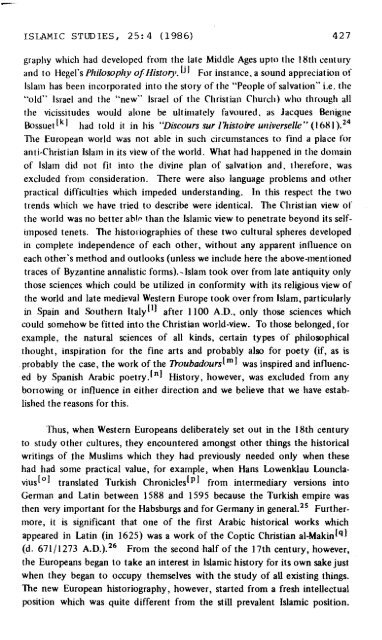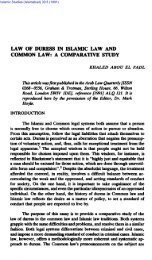ISLAMIC & WESTERN HISTORIOGRAPHY
ISLAMIC & WESTERN HISTORIOGRAPHY
ISLAMIC & WESTERN HISTORIOGRAPHY
You also want an ePaper? Increase the reach of your titles
YUMPU automatically turns print PDFs into web optimized ePapers that Google loves.
<strong>ISLAMIC</strong> STUDIES, 25: 4 (1986) 427<br />
graplly which had developed from the late Middle Ages upto the 18th century<br />
and to Hegel's Philosophy ofHistoy.[jl For instance. a sound appreciation of<br />
lslain has been incorporated into the story of the "People of salvation" i.e. thc<br />
"old" lsrael and the "new" lsrael of the Christian Church) who through all<br />
the vicissitudes would alone be ultimately favoured, as Jacques Benigne<br />
Bossuet [k 1 had told it in his "Discours sur l'histoire ur~iversellc" (1 68<br />
The European world was not able in such circumstances to find a place for<br />
anti-Christian Islam in its view of the world. What had happened in the domain<br />
of Islam did not fit into the divine plan of salvation and. therefore. was<br />
excluded from consideration. There were also language probleins and other<br />
practical difficulties which impeded understanding. In this respect the two<br />
trends which we have tried to describe were identical. The Christian view of<br />
the world was no better ahre than the Islamic view to penetrate beyond its self-<br />
mposed tenets. The historiographies of these two cultural spheres developed<br />
in complete independence of each other, without any apparent inlluence on<br />
each other's method and outlooks (unless we include here the above-mentioned<br />
traces of Byzantine annalistic forms).-Islam took over from late antiquity only<br />
those sciences which could be utilized in conformity with its religious view of<br />
the world and late medieval Western Europe took over from Islam, particularly<br />
in Spain and Southern ltaly[ll after 1100 A.D., only those sciences which<br />
could somehow be fitted into the Christian world-view. To those belonged, for<br />
example, the natural sciences of all kinds, certain types of philosophical<br />
thought, inspiration for the fine arts and probably also for poety (if, as is<br />
probably the case, the work of the 7koubadours["'l was inspired and influenc-<br />
ed by Spanish Arabic poetry.[n1 History, however, was excluded from any<br />
borrowing or influence in either direction and we believe that we have estab-<br />
lished the reasons for this.<br />
Thus, when Western Europeans deliberately set out in the 18th century<br />
to study other cultures, they encountered amongst other things the historical<br />
writings of the Muslims which they had previously needed only when these<br />
had had some practical value, for example, when Hans Lowenklau Lounclavius[Ol<br />
translated Turkish ~hronicles[~l from intermediary versions into<br />
German and Latin between 1588 and 1595 because the Turkish empire was<br />
then very important for the Habsburgs and for Germany in general.25 Furthermore,<br />
it is significant that one of the first Arabic historical works which<br />
appeared in Latin (in 1625) was a work of the Coptic Christian al-bIakinIql<br />
(d. 671 11 273 A.D.).~~ From the second half of the 17th century, however,<br />
the Europeans began to take an interest in Islamic history for its own sake just<br />
when they began to occupy themselves with the study of all existing things.<br />
The new European historiography, however, started from a fresh intellectual<br />
position whch was quite different from the still prevalent Islamic position.
















